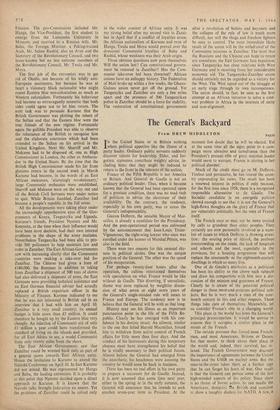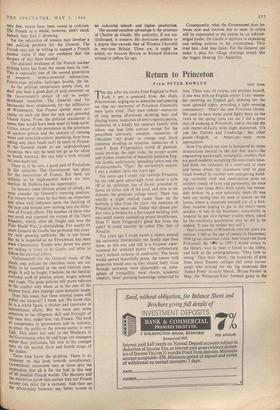The General's Backyard
From DREW
TN the United States or in Britain nothing 'whets political appetites like the illness of a party leader. Ordinary public servants suddenly discover talents for leadership. Elder, and for- gotten, statesmen contribute weighty advice, in- cluding hints that they might be induced to return to the front in the interests of the nation.
France of the Fifth Republic is not America or Britain. And General de Gaulle is not an ordinary political leader. Thus, when it became known that the General had been operated upon for a prostate condition, there was no mad rush of politicos to advise the electorate of their availability. On the contrary, the tendency, especially in his own party, was to stress the General's indispensability.
Gaston Defferre, the amiable Mayor of Mar- seilles, is already a candidate for the Presidency. And the post-operational period was enlivened by the announcement that Jean-Louis Tixier- Vignancour, the right-wing lawyer who once was enrolled under the banner of Marshal Main, was also in the field.
There were two reasons for this unusual shy- ness in political circles. One was the unique position of the General. The other was the speed of his recuperation.
For perhaps twenty-four hours after the operation, the callous entertained themselves with speculation on what France would be like without de Gaulle. This diverting, if unrealistic, theme was soon replaced by weightier discus- sion of what seven or eight more years of the General's single-minded rule will mean to France and Europe. The tendency now is to believe that the General will be with us that long.
History may see his illness as an important punctuation point in the life of the Fifth Re- public. Clearly he has emerged with his con- fidence in his destiny intact. An ailment, similar to the one that felled Harold Macmillan, forced him to withdraw from active control of French affairs for little more than four days. And the conduct of his lieutenants during this temporary absence must have strengthened his belief that he is vitally necessary to their political future. Almost• before the General had emerged from the anwsthetic, his henchmen were assuring the country he would soon be back in business.
There has been no real effort in his own party to prepare a successor for de Gaulle. Instead, it is now assumed that some time next year, either in the spring or in the early autumn, the General will announce that he intends to seek another seven-year term as President. At the moment few doubt that he will be elected. Yet at the same time all the signs point to a cam- paign more abrasive and tumultuous than the President's present r8le of great national leader would seem to warrant. France is stirring in her political slumber.
Much of the credit must go to M. Defferre. Tireless and persuasive, he has toured the coun- try expounding his views. The result has been a renewed interest in politics if only because, for the first time since 1958, there is a recognised responsible alternative to de Gaulle. The Socialist candidate is an energetic politico shrewd enough to see that it is not the General's high-flown thoughts on the glory of France that are vulnerable politically, but the state of France itself.
The French may or may not be more excited by calls to grandeur than other peoples. They certainly are now personally involved in a num- ber of issues to which Defferre is drawing atten- tion: the soaring price of bifstek, the perilous bvercrowding on the roads, the lack of hospitals and schools and the need, especially in the provinces, for a housing programme that will replace the nineteenth- or the eighteenth-century dwellings in which so many live.
One of de Gaulle's attributes as a politician has been his ability to rise above such subjects and draw his compatriots with him into a dis- cussion of the mission and greatness of France. Clearly he is aware of the potential political danger in these meat-and-potatoes political sub- jects. But he is very much a man of the nine- teenth century in this and other respects. These things take care of themselves. Meanwhile, let us consider France's role in a• changing world.
This place in the world has been the General's principal preoccupation. It would be unwise to assume that it occupies a similar place in the minds of the French.
The outside pressure that forced most French- men, and most Americans. Britons or Danes, for that matter, to think about their place in the world and, indeed, their survival, has re- laxed. The French Government may discount the importance of agreements between the United States and the USSR on nuclear arms. But the man-in-the-street takes them as a further sign that he can forget his fears of war. One result is that the General can pursue some of the less high-minded aspects of his policy. Since there is no threat of Soviet action, he can needle the Americans. deni.gratc• The British and continue to show a haughty disdain for NATO. A few, a
Vey few, voices have been raised in criticism. The French as a whole, however, don't mind. Indeed, they find it diverting.
Yet the relaxation of tension may develop a real political problem for the General. The French may not be willing to support a French nuclear force if they are confident that the dangers of war have receded.
The political weakness of the French nuclear striking force has from the outset been its cost. This is especially true of the second generation of weapons: atomic-powered submarines, Polaris-type missiles, hydrogen bombs, the lot.
As the political temperature slowly rises, we shall also hear a good deal of acid comment on the. Government's policy of aid to under- developed countries. The General and his lieutenants have emphasised, for the edification of Washington, that France spends more per Capita on such aid than the rich and powerful United States. From the political standpoint it seems they would have been wiser to keep quiet. Critics, aware of the prevalence in the provinces of outdoor privies and the absence of running Water and twentieth-century plumbing, have been asking why these funds can't be spent in France. If the General wants to see underdeveloped countries, they say, he need not go as far afield as South America. He can take a .look around his own backyard.
There is, to be sure, a good deal of Poujadism in this criticism. The Government has plans for the renovation of France. But these are unlikely to • be implemented before the next election. M. Defferre has his opportunity.
To balance these obvious points of attack, we must consider the General's towering position. For twenty-four years he has been an important and often vital influence upon the thinking of the men and women now moving into the direc- tion of French affairs. The number of those who can recall and expound the virtues of the Third ,RePuhlic, which, after all, fought and won the Fuss World War, is diminishing. For nearly six Years General de Gaulle has governed this coun- trY with growing authority. He is not loved. But he is respected as no Frenchman has been tiinee Clemenceau. People who detest his party are willing to listen to de Gaulle and often to follow his paternal advice. Unfortunately for the General, many of the ideals and policies he cherishes most are un- lately to be essential in the next election cam- Paign. It will be fought, I believe, on the familiar everyday stuff of politics, prices, wages, schools and roads. The great policies will prove relevant to the conflict only when, as in the case of the nuclear force, they impinge upon domestic issues. Does this mean that these internal issues will defeat the General? I think not. We know that he is a world figure, a thinker and innovator in international affairs. But we must pay some attention to the diligence, skill and foresight of the men who, under him, run France. The level of competence in government and in industry, in either the public or the private sector, is very high. This refers not only to the Ministers in the Government who, by and large, are managers rather than politicians, but also to the younger rnen on the second, third and fourth rungs of the ladder.
These men know the problem. There is no GdenieY on this level towards complacency. vernment statements may at times give the impression that all is for the best in this best 01 all possible French. worlds. The planners and the executives know that neither they nor French society can relax for a moment. And they see the relationship between, say, better homes in
an industrial, suburb and higher production. The second manifest advantage is the presence of Charles de Gaulle. His authority, if not un- challenged, is massive. He dominates politics to a degree that exceeds that of Winston Churchill in war-time Britain. There are, it might be added, no Aneurin Bevans or Richard Stokeses around to deflate his ego. Consequently, what the Government does be- tween now and election day to meet its critics will be expounded to the nation by an acknow- ledged leader. De Gaulle is supreme in explaining and selling policies to his countrymen. They trust him. And they Listen. For the General can make a plan for village drainage sound like the bugles blowing for Austerlitz.















































 Previous page
Previous page